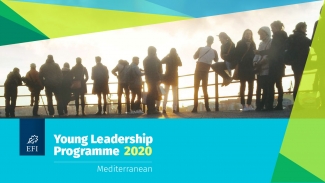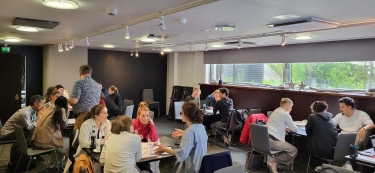Mediterranean forests in urbanised societies: will you rise to the challenge?

Two out of three people already live in urban areas in Mediterranean countries, a figure higher than the world average and only expected to increase. Such urban growth exacerbates current challenges faced by cities, including excessive land use, accelerated degradation of built cultural heritage, groundwater pollution and ineffective waste management. Challenges are also felt in former rural communities who struggle to adapt to dramatic changes in lifestyle and income generation brought about by rapid urbanisation. The effect on the environment and population health is cumulative and, if not addressed urgently, the consequences for Mediterranean societies and ecosystems could be significant, especially when considered alongside expected negative impacts of climate change.
Mediterranean forests can play a pivotal role in supporting our cities to become more resilient and in developing a sustainable rural-urban interface. Urban forests and initiatives to green our cities are becoming increasingly popular, but new approaches are necessary to target territorial, environmental, economic and social imbalances.
What we need now is new thinking to take us beyond the 21st century and fresh ideas on how we can exploit the full potential of Mediterranean forests to support our urbanised societies to become more sustainable.
Join us for YLP-MED 2020 and broaden the horizon for the leaders of tomorrow!
The 2020 edition of the EFI Young Leadership Programme: YLP-MED 2020 provides training, knowledge sharing and networking on Mediterranean forest-based value chains and their contribution to a circular bioeconomy, with a special focus on cities and urbanised societies. Young professionals will interact with global and regional leaders, network with peers and develop strategic thinking on how to manage and use forest resources to address societal challenges.
Confirmed speakers for the programme include Christine Farcy (Catholic University of Louvain), Xavier Marcet (Lead for Change), Ricard Armengol (Provital Group), Vicente Guallart, (Institute for Advanced Architecture of Catalonia), Mireia Gascon (Barcelona Institute for Global Health), Roser Maneja (UNESCO International Centre on Mediterranean Biosphere Reserves), Bart Muys (University of Leuven) and Sven Wunder (EFI).
We are also pleased to announce collaboration with various partners for the 2020 edition. These include Valldaura Labs and the Institute for Advanced Architecture of Catalonia (IAAC), who will host the programme for a day spent at its campus in Collserola, Barcelona. Other partners supporting the programme include Silva Mediterranea , IUCN Centre for Mediterranean Cooperation (IUCN Med) , UNESCO International Centre on Mediterranean Biosphere Reserves , Forest Sciences and Technology Centre of Catalonia (CTFC) and CIHEAM .
EFI welcomes applications from young professionals with a few years of work experience, both from Mediterranean countries as well as other countries working with Mediterranean countries. The age range is approximately 25-35 years and the aim is to have a mix of participants from research (e.g. PhD students), policy (e.g. young civil servants from Ministries) and practice (young professionals). Up to 20 participants will beselected.
The EFI Young Leadership Programme was established in 2014 and has run annual editions with rotating geographical focus, including on Russia and Eurasia. The first Mediterranean edition took place in 2018 and was described by participants as a positive and inspirational experience with 100% of participants recommending the programme.
YLP-MED 2020 will take place from 29 June to 3 July at the Sant Pau Art Nouveau Site in Barcelona, Spain, where EFI has its regional office.
Further info here. Application period is now closed.



